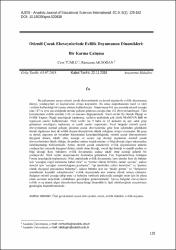Otizmli çocuk ebeveynlerinde evlilik doyumunun dinamikleri: Bir karma çalışma

View/
Access
info:eu-repo/semantics/openAccessDate
2019Author
Anadolu Üniversitesi
Tümlü, Cem
Akdoğan, Ramazan
Metadata
Show full item recordCitation
Tümlü, C, Akdoğan, R. (2019). Otizmli çocuk ebeveynlerinde evlilik doyumunun dinamikleri: Bir karma çalışma. Anadolu Journal of Educational Sciences International (AJESI), 9 (1), 129-162.Abstract
Bu çalışmanın amacı otizmli çocuk ebeveynlerinin eş destek algıları ile evlilik doyumunun
düzeyi, yordayıcıları ve kaynaklarını ortaya koymaktır. Bu amaç doğrultusunda nicel ve nitel
verilerin kullanıldığı bir karma yöntem kullanılmıştır. Araştırmaya 0-6 yaş arasında otizmli çocuğu
olan 147 ve aynı yaş aralığında normal gelişim gösteren çocuğu olan 142 ebeveyn katılmıştır. Tüm
katılımcıların evlilik süreleri 2-16 yıl arasında değişmektedir. Nicel veriler Eş Destek Ölçeği ve
Evlilik Yaşamı Ölçeği aracılığıyla toplanmış, verilerin analizinde çok yönlü MANOVA testi ve
regresyon analizi kullanılmıştır. Nitel veriler ise 9 baba ve 12 anneden üç ayrı odak grup
görüşmesi aracılığıyla toplanmış ve içerik analizi yapılmıştır. Nicel bulgular otizmli çocuk
ebeveynlerinin normal gelişim gösteren çocuk ebeveynlerine göre hem eşlerinden gördükleri
destek algılarının hem de evlilik doyum düzeylerinin düşük olduğunu ortaya koymuştur. İki grup
eş destek algısının alt boyutları bakımından karşılaştırıldığında; otizmli çocuk ebeveynlerinin
duygusal destek, takdir etme desteği ve sosyal ilgi desteği algılarının normal çocuk
ebeveynlerinden düşük olduğu, iki grubun sadece maddi yardım ve bilgi desteği algısı bakımından
farklılaşmadığı belirlenmiştir. Ayrıca otizmli çocuk annelerinin evlilik doyumlarının anlamlı
yordayıcıları sırasıyla duygusal destek, takdir etme desteği, sosyal ilgi desteği ve maddi yardım ve
bilgi desteği iken; babaların evlilik doyumunda sadece takdir etme desteği anlamlı bir
yordayıcıdır. Nitel veriler araştırmacılar tarafından geliştirilen Yarı Yapılandırılmış Görüşme
Formu aracılığıyla toplanmıştır. Nitel analizlerde evlilik doyumunda hem anneler hem de babalar
için “çocuğun engel durumunu kabul etme” ve “partner olarak birbirine zaman ayırma”, sadece
anneler için “çocuğun sorumluluğunu paylaşma”, “eşi tarafından yalnız bırakılma” ve “partner
olarak duygusal paylaşımda bulunma”, sadece babalar için ise “takdir görme” ve “iletişimsel
sorunlardan kaynaklı anlaşılamama” evlilik doyumunda ana temalar olarak ortaya çıkmıştır.
Bulgular otizmli çocuğa sahip anne ve babalara verilecek psikolojik desteğin onlar için ön plana
çıkan sorunlar temelinde yürütülmesi gerektiğini göstermektedir. Ayrıca bulgular ebeveynlerin
evlilik ve eş destek algısı düzeylerinin başka hangi dinamiklerle ilgili olabileceğinin araştırılması
gerektiğini düşündürmektedir. The aim of this study is to reveal that the levels of spouse-support and marital satisfaction
perceptions of parents with autistic children. Also is aimed to figure out what is the predictors and
dynamics/sources of the marital satisfaction of the parents. In line, a mixed method was used with
qualitative and quantitative data. The study included 147 parents of autistic chidren aged 0-6 years
and 142 parents of age-matched children who showed normal development. All participants had
been married for 2-16 years. The quantitative data were collected via The Spouse Support Scale
and Marriage Lives Scale. In the analysis of quantitative data, the MANOVA test and regression
analysis were used. Qualitative data were collected via a Semi-Structured Interview Form which
developed by the researchers. These data were obtained from 3 separate focus groups formed of 9
fathers and 12 mothers. The quantitative data showed that the parents of autistic children had
lower perceptions of spouse support and lower levels of marital satisfaction compared to the
parents of healthy children. When comparisons were made between the groups; the perceptions of
emotional support, appreciation and social support of the parents of autistic children were found to
be lower than those of the parents of normally developing children. No difference was determined
between the groups in respect of the perceptions of economical and information support.
Significant predictors of marital satisfaction of the mothers of autistic children were found to be
emotional support, appreciation, social support, economical support and information support,
respectively. For the fathers of children with autism, only appreciation was a significant predictor
of marital satisfaction. In the analysis of the qualitative findings, main themes emerged in marital
satisfaction of “acceptance of child’s disability”, and “time allocation as a partner” for both
mothers and fathers, “sharing the responsibility for the child”, “being left alone” and “emotional
sharing as a partner” for mothers, and “being appreciated” and “can’t understanding due to
communication problems” for fathers. Findings suggest that psychological support for parents with
autistic children should be conducted based on problems that are at the forefront of them. In
addition, findings show that, it needs to be investigated what are the other dynamics of marital
satisfaction and spouse support perceptions of parents with autistic children.
Source
Anadolu Journal of Educational Sciences International (AJESI)Volume
9Issue
1Collections
- Cilt: 09 Sayı (1) [11]
- Makale Koleksiyonu [134]
- TR-Dizin İndeksli Yayınlar Koleksiyonu [3512]

















